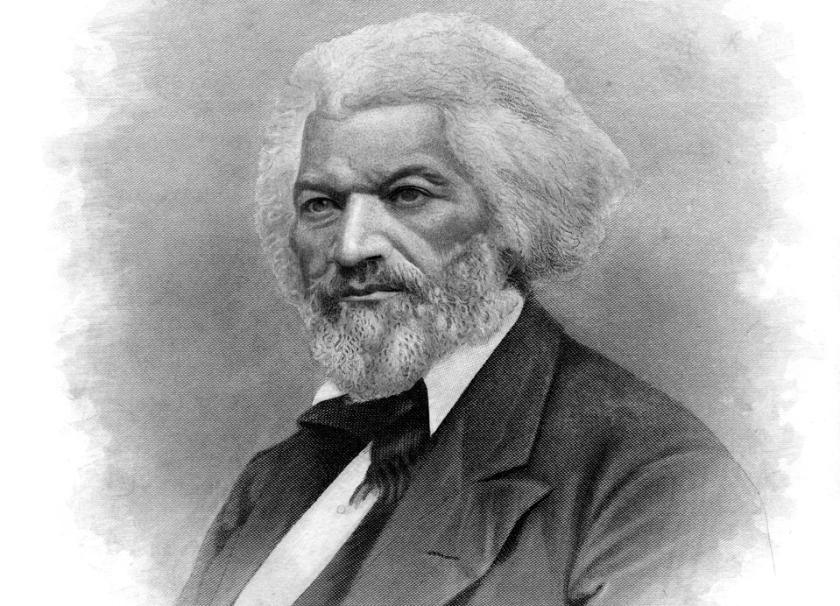
Frederick Douglass And Co-ops in 1846
When Douglass Came to Rochdale, England a Slave and Left a Free Man
By David J Thompson
Frederick Douglass drew himself up to his height of just over 6
feet, looked out over the packed audience of over 1,000 - mostly
millworkers - and vociferously and eloquently described his life
as a slave in the United States of America. It was October 10th,
1846, and Douglass had just been warmly introduced by John
Bright, a British Member of Parliament. Even at a young age,
Bright had already emerged as one of the most powerful
speakers in Britain against slavery. There was a sold-out house
in the Public Room on Baillie Street in Rochdale, Lancashire,
England.
Douglass used his time to educate the engaged Rochdale
audience about his life as a slave and slavery itself in the United
States. Douglass spoke at the Public Hall in Rochdale in 1846,
five times between October 10 and 14, and twice more on
November 10 and 11. On October 12, Douglass returned to
Manchester to speak to 4,000 people at the Free Trade Hall,
and then returned to Rochdale.
Frederick Douglass was 28-years-old and had just published his
first book:”Narrative of the life of Frederick Douglass, An
American Slave.” Because the book was an instant best seller in
the U.S., and because the press identified the public places
where Douglass spoke, Douglass was at grave risk of
immediate arrest. Douglas had fled to Britain because his
American owner, Thomas Auld, had announced that he
intended to capture Douglass and return him to forced slavery.
William Lloyd Garrison, the leading American Abolitionist, had
accompanied Douglass to Rochdale, and also spoke at each of
the October meetings.
Surely among the audience at the Public Hall in Rochdale that
night and during the other speeches that Douglass gave that
week in Rochdale, were some of the founders of the first
modern co-op. The tiny store opened by the Rochdale Pioneers
at 31 Toad Lane was about a three-minute walk away from the
Public Room on Baillie Street. All of the original 28 members of
the Rochdale Equitable Pioneers Society were heavily engaged
in the social and political change of that era. Every Sunday,
many of Rochdale’s co-op founders and members attended the
non-conformist churches, such as Methodist, Unitarian, and
Baptist chapels. Here, they would have heard sermons on the
evils of slavery. These local activists had started the Co-op in
1844, to change their daily circumstances. Every day at work in
the mills or walking on its streets, the Rochdale Pioneers were
recruiting other millworkers to join their co-op.
John Bright was an early supporter of the ‘self-help’ philosophy
of the Rochdale Pioneers and occasionally spoke in Parliament
about the accomplishments of his local Co-op. Bright
supported changes in the law that gave cooperatives greater
financial power. Additionally, Bright spoke highly of the co-ops’
ability to be democratic while running a business. Bright noted
in his 1854 diary that he was to visit the co-op to check on its
progress. Bright used the example of the Rochdale Equitable
Pioneers Society to sway other members of parliament in favor
of extending the vote to working men.
Bright’s’ brother, Jacob Bright, was also a strong supporter of
cooperatives. In the 1850s he was appointed as an arbitrator of
the Co-operative Manufacturing Society and the cooperatively
run Corn Mill. Subsequently, Jacob Bright became the first
elected Mayor of Rochdale.
During his almost three-year stay in Britain (1845-1847),
Douglass gave roughly 300 public speeches in many different
towns and cities in Britain. Many of his speaking engagements
and stays were hosted by a strong network of Quakers, John
Bright, being one of them. Bright had arranged for Douglass to
speak in Rochdale on seven different occasions in 1846 alone.
Douglass was also a regular guest at “One Ash,” the Rochdale
home of John Bright and his family. In “The Life and Times of
Frederick Douglass,” page 235, Douglass writes about his first
visit to England (1845-1847), “I was, besides, a welcome guest at
the home of Mr. Bright in Rochdale and treated as a friend and
brother among his brothers and sisters.”
Beginning in August of 1846, Ellen Richardson, a Newcastle
Quaker, engaged in raising funds from her circle of Quakers to
buy Frederick Douglass out of slavery. As a result of Douglass’
stay with John Bright in Rochdale, Bright immediately
contributed one-third of the money needed to purchase
Douglass from his American slaveholder. In October of 1846,
Douglass arrived in Rochdale a fugitive slave. With Bright’s
contribution, however, Douglass left Rochdale about to become
a free man. Ellen Richardson wrote that with the gift of Bright,
they were certainly going to be able to pay the price for
Douglass’s freedom from slavery.
By December 1846, Bright and the other Quakers learned that
the sale was almost complete. Towards the middle of
December, Frederick Douglass learned by steamship mail that
as of December 12, 1846, Douglass was no longer legally a slave
in the USA, and his papers of manumission had been
confirmed. On December 22nd, 1846 Douglass wrote a reply to
a letter written on December 12th by Henry C Wright. Wright
was a fellow abolitionist who occasionally spoke on the same
platform as Douglass. Douglass was cautious about being allied
with him as Wright was a fiery speaker with more radical views
than Douglass. Wright had written to Douglass severely
critiquing him for allowing people to buy him as a slave. From
the content of each of the letters, it is evident that both Wright
and Douglass know that Douglass is being freed. At the time,
Douglass was staying twelve miles away from Rochdale at 22 St
Ann’s Square, Manchester.
Frederick Douglass remarked on March 30, 1847, at a farewell
banquet at the London Tavern in London:
- I do not go back to America to sit still, remain quiet, and enjoy
ease and comfort. . . I glory in the conflict, that I may hereafter
exult in the victory. I know that victory is certain. I go, turning
my back upon the ease, comfort, and respectability which I
might maintain even here. . . Still, I will go back, for the sake of
my brethren. I go to suffer with them; to toil with them; to
endure insult with them; to undergo outrage with them; to lift
up my voice in their behalf; to speak and write in their
vindication; and struggle in their ranks for the emancipation
which shall yet be achieved.
In his conclusion, Douglass states; "I came here a slave, but I go
back free.”
On April 2, 1847, Douglass stayed with John Bright in Rochdale -
the day before he sailed from Liverpool back to America for the
first time in his life as a free man.
Douglass arrived home in the spring of 1847. He sailed early
Sunday, April 4. The last night of his stay abroad was spent as
the guest of John Bright and his sisters. From no one in
England could Douglass have received a more gracious
welcome and friendly benediction than from this great
commoner. “Frederick Douglass: A Biography by Booker T.
Washington,” (p 65). Originally published: Philadelphia: G.W.
Jacobs, 1906.
The linking of Frederick Douglass, John Bright, Rochdale, and
the first modern co-op began in 1846. The link between
cooperatives and the campaigns against slavery, and for civil
rights continues strongly to this very day and for eons to come.
This linkage can be divided into two different eras;
1. Anti-Slavery and Co-ops
Frederick Douglass’ sojourn in Britain in 1845-1847, occurred
during the same years that consumer and worker cooperatives
were being born all over Britain. The Chartist movement might
have been stalled by Parliament, but the struggle for local
democratic change carried on in the form of cooperatives.
Many of the British Chartist leaders who welcomed Douglass to
speak were also engaged in building different types of
cooperatives. Due to their strong interest in building
democratically owned local institutions, many cooperatives
emerged in the same towns where Douglass spoke.
Not only did Douglass speak in Rochdale, the English cradle of
the cooperative movement, but Douglass had also spoken
earlier in Fenwick, on April 6, 1846. Fenwick is the Scottish
birthplace of the Fenwick Weavers (1761-1839), an early model of
cooperatives. It was an era of societal change which sought
democracy and abhorred slavery of any kind. The audiences
that came to hear Douglass wanted to build the same slavery-
free world that Douglass spoke of. The fledgling cooperative
movement was an ardent activist in the British fight against
slavery everywhere. In the West Indies, the last bastion of
British Slavery did not end until 1838.
While in Britain, Douglass was introduced to other efforts to
obtain democratic rights. The British Chartist leader, the Irish
born Feargus O’Connor led the actions to create cooperative
land societies. Members would buy shares in a land cooperative
that would use the combined funds to buy land and then by
lottery allocate parcels of the land to the members. The intent
was to create a parcel of land of the value that would give the
member the right to vote. Thousands of democratic activists
bought shares in these Chartist Cooperative Land Companies
and a number of the Rochdale Pioneers were among them.
Since Douglass spoke, on occasion, on the same platform as
O’Connor during his stay in Britain, Douglass would have
learned of the Chartists’ property path to democracy. Douglass
also often spoke on the same platform as Herrington, and these
Chartists later played a role in evangelizing about working
people needing to start cooperatives. There is a possibility that
Douglass may have visited one of the Chartist colonies
(Heronsgate?) to see how the parceling of property had created
a number of voting free-holders.
John Bright was the first president of the similar efforts of the
Rochdale Freehold Society. In 1850, the society bought 24 acres
of land in Rochdale which was then divided up into 500 pieces
of land for houses that would create over time 500 new voters
in the town. There is an area of Rochdale today still called
Freehold centered on Freehold Street. Extending the vote to
the middle and working classes would energize new political
parties that would later change the face of British politics.
During his lengthy sojourn in Britain (1845-47) while staying in
London, Douglass was often the guest of John Bright and
stayed at the Reform Club on Piccadilly.
There is a second possibility of Frederick Douglass and Charles
Howarth, (one of the original 28 founders of the Rochdale
Pioneers and its second President) being in the same room at
the same time. It is documented separately that in 1847,
Douglass and Howarth were each in the House of Commons in
the “Strangers Gallery” (a balcony with three narrow rows of
seating for guests and visitors) to hear John Bright speak on the
Ten Hours Bill. What has not been possible to confirm if it was
on the same date?
2. Chronology of Support for the US North in the Civil War (1861-
65): The Role of Douglass, Bright, Rochdale, and Cooperatives
Frederick Douglass had a long and strong friendship with
John Brown that began in Brown’s home in Springfield,
MA, in 1847. In 1858, Brown stayed with Douglass at his
home in Rochester, NY, and asked Douglass to take part in
the attack at Harpers Ferry. In August of 1859, Douglass
met secretly with Brown at a quarry near Chambersburg,
PA, to discuss the details of the raid. At that meeting,
Douglass told Brown he would not participate.
Douglass was giving a talk when he heard that the
Harper’s Ferry Raid had begun. Douglass immediately fled
to England in fear of being arrested as a John Brown
accomplice. Douglass arrived in Liverpool on November
24th, 1859 and spent Christmas and January with Julia
Crofts (nee Griffiths) and stayed in Britain until leaving
from Liverpool on April l 1860, until he was assured that his
relationship to Brown was no longer cause for arrest.
(Frederick Douglass Encyclopedia, p60)
When the Civil War broke out in 1861, the bottom fell out
of the cotton market at the Manchester Exchange. Soon
hundreds of cotton manufacturers in Lancashire either
closed down or substantially reduced production. Sixty
percent of the mills were idle. Thousands of cotton factory
workers were laid off and they and their families faced
new levels of poverty and starvation.
During the 1860s, the Rochdale Observer newspaper
actively opposed slavery. The paper printed numerous
letters from Rochdale millworkers who had immigrated to
the USA to escape the unemployment caused by the Civil
War. Those letters urged the people of Rochdale to keep
up their support by describing the slavery they had seen
and learned about in the USA. The Rochdale and other
British cooperators who had arrived in the USA
immediately organized consumer co-ops in the mill towns
of the US North East. A co-op in the town of Lawrence, MA,
is a good example of the activist impact of mill worker
immigrants from Rochdale. The American co-ops started
by British immigrants from the mill towns of the US North
East also took strong action against slavery.
In 1863, to honor the efforts of those Americans who
fought against slavery and supported the North against
the South during the Civil War, the Co-operative
Wholesale Society (CWS) in Manchester adopted their
motto as “Labor and Wait” spelling Labor in the American
style. In addition, the CWS leaders renamed their annual
meeting their ‘Congress’ and the chairman of ‘Congress’
was renamed President. Over 160 years later, the annual
meeting of British co-ops is still called ‘Congress’ in honor
of those who fought slavery.
Lincoln kept a framed photo of John Bright in his office in
the White House.
After Lincoln was shot, historians looked at what was in his
pockets. One item Lincoln had was a clipping of John
Bright urging people to vote for Lincoln.
In Britain, Manchester was the heart of the fight against
the South and slavery and the Union and Emancipation
Society was the leading voice and critical organizer of
British anti-slavery opinion during the US Civil War. The
largest indoor- attended anti-slavery meetings in Britain
were held at the Free Trade Hall in Manchester. Douglass
had spoken eight times at the Free Trade Hall and other
Manchester locations in 1846 and 1847, and once in 1860.
J. C. Edwards and E. O. Greening were the hard-working,
unpaid ‘Honorable Secretaries’ of the Union and
Emancipation Society, Britain’s most powerful
organization against slavery and in favor of the North.
Edwards and Greening were also both elected board
members and officers of the Cooperative Wholesale
Society. Thomas Bayley Potter, the Chairman of the Union
and Emancipation Society, was Member of Parliament for
Rochdale from 1865-1895. In 1891, his niece, Beatrice Potter
wrote, “The Co-operative Movement in Britain.”
There is a statue of Abraham Lincoln in Manchester - one
of only a few in Britain. On the plinth is Lincoln’s personal
letter of January 13, 1863, addressed to “The Workingmen
of Manchester.”
The Touchstones Museum in Rochdale has the only
remaining barrel of those sent to Liverpool in 1863, on the
SS Griswold, where 15,000 barrels of flour were sent by
sympathetic Americans to feed people in Lancashire
hungry from the vast unemployment caused by the
Cotton Famine.
During the Cotton Famine, The Rochdale co-op used its
meeting and reading rooms for classes to increase the
educational capacity of the members who were
unemployed.
In late 1862, thousands of the inhabitants of Rochdale
personally signed a petition asking Lincoln to free all
slaves in the USA. That petition is in the collection of the
Library of Congress in Washington, DC. Hundreds of co-op
members from Rochdale will have signed the petition. By
1865, there were 5,326 members of the Rochdale co-op.
When the Rochdale Pioneers opened their new main
store on September 28, 1867, they invited English-born
Richard Hinton to speak at the ceremony. Hinton was an
avid enemy of slavery and a close friend and associate of
John Brown. Hinton had reached the rank of Colonel in
command of Colored Regiments and was also Acting
Inspector General of the Freedman’s Bureau during the
Civil War.
In front of the City Hall at Manchester facing the building
are two large statues of Abel Heywood and John Bright.
They are both placed equidistant from the Albert
Memorial centerpiece. Both of these reformist leaders
spoke out vociferously against slavery and both of them
urged working people to join cooperatives.
In 1863, 300 Lancashire and Yorkshire cooperatives
banded together to form the North of England Co-
operative Society. In 1872, that society changed its name
to the Co-operative Wholesale Society and in 2001, the
name was changed again to its present-day name, The
Co-operative Group. No matter the name, from 1863
forward to this very day, Manchester has been the
commercial and administrative center of the British Co-
operative Movement.
Cooperatives have always been linked with efforts to build
a better and inclusive world. The ties started in 1846,
between Frederick Douglass, John Bright, Rochdale, and
Cooperatives that paved the way for a very special road.
Cooperators today continue that work in Britain, the USA,
and all around the world. What a great start we were
given.
More Co-op News
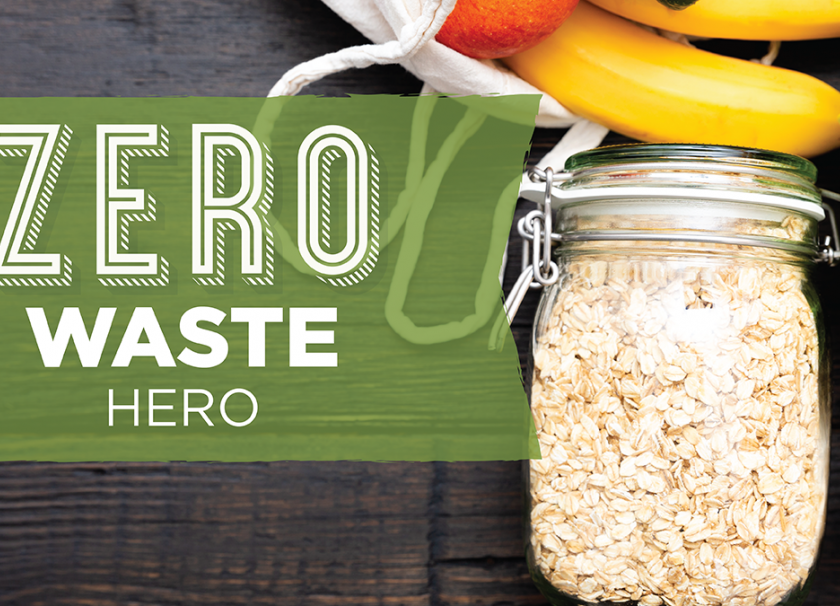
Tips for a Sustainable Kitchen
By Mahlea Rasmussen, Education Coordinator
Outside of work I spend a lot of time in the kitchen. I find it a soothing space to create nourishing meals and lasting memories. I find it essential to be as eco-friendly as possible and a few changes can transform your kitchen into a sustainable center of your home.

Earth Day Bulk Sale! April 17-21
Save money while working towards a more sustainable shopping experience! The Co-op bulk department is a great "first stop" for your grocery lists - everything from hummus mix to local honey to pet food is available. Plus there's less waste, all the way from shipping to ended up in your shopping cart.
Check out a quick tour below:

Film festival giveaway
Enter your name and email below to be entered to win two film vouchers for the 2019 Ashland Independent Film Festival.
No purchase necessary. Giveaway is not endorsed or sponsored by AIFF. US residents only. Entry will be closed at 5pm PT on Monday, April 15.

The state of plastics
Many Co-op owners and shoppers have shared their interest in reducing plastic usage in the store. From bioplastics, to compostable plastics to recycling options, the Ashland Food Co-op continues to research what works best as we move towards our goal of being a zero waste store. Here is where we stand.
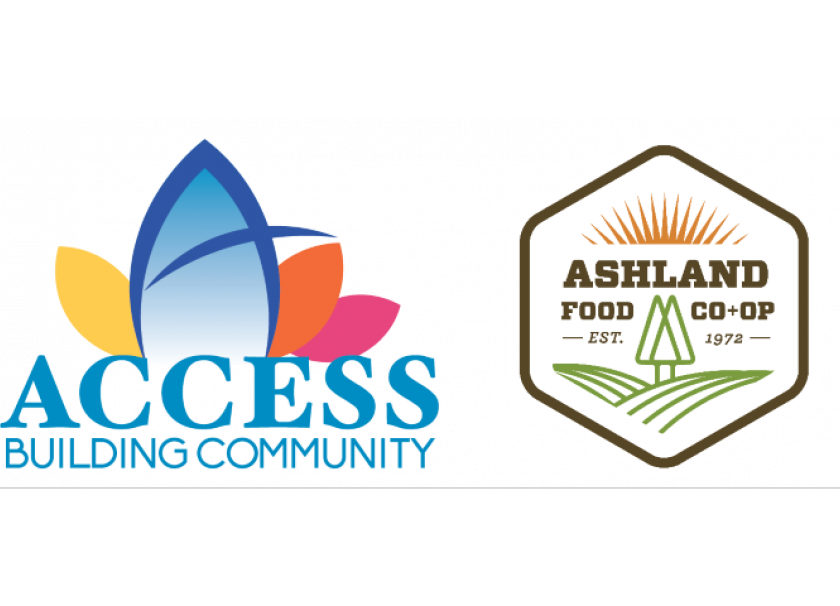
Ashland Food Co-op Celebrates 20-year Partnership with ACCESS
We are proud of a partnership with ACCESS that has benefited the community immensely over the past twenty years. Read on for more about the partnership, or watch the short video below.
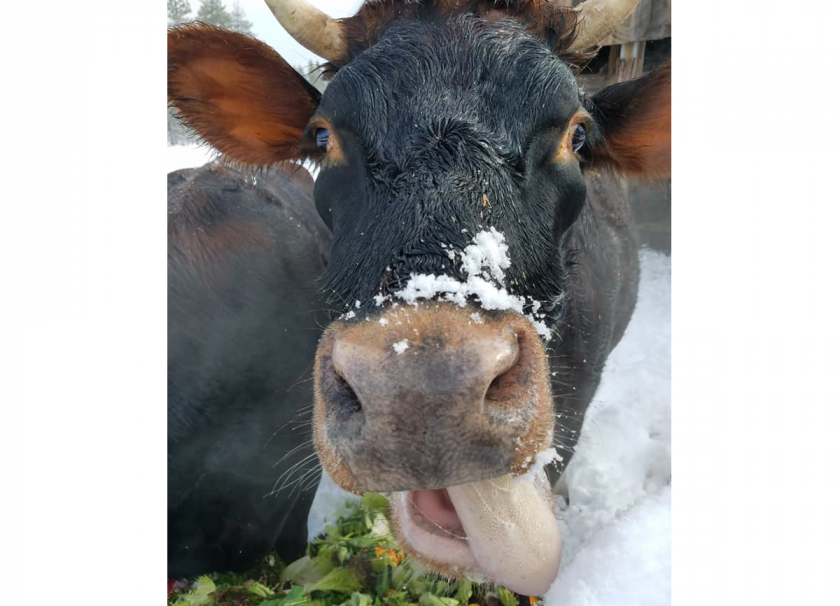
Food waste at the Co-op
By Rianna Koppel, Sustainability Coordinator
How many times in the past month have you reached back in the fridge to snack on some fresh strawberries only to discover… mold?! In the United States, 40% of food is wasted every year. Luckily, how we address food waste can have a major impact. According to Paul Hawkin’s Drawdown, reducing food waste is #3 on the list of best ways to reduce carbon dioxide emissions. At the Co-op, we use the EPA’s Food Recovery Hierarchy as a guide to bettering our own practices.
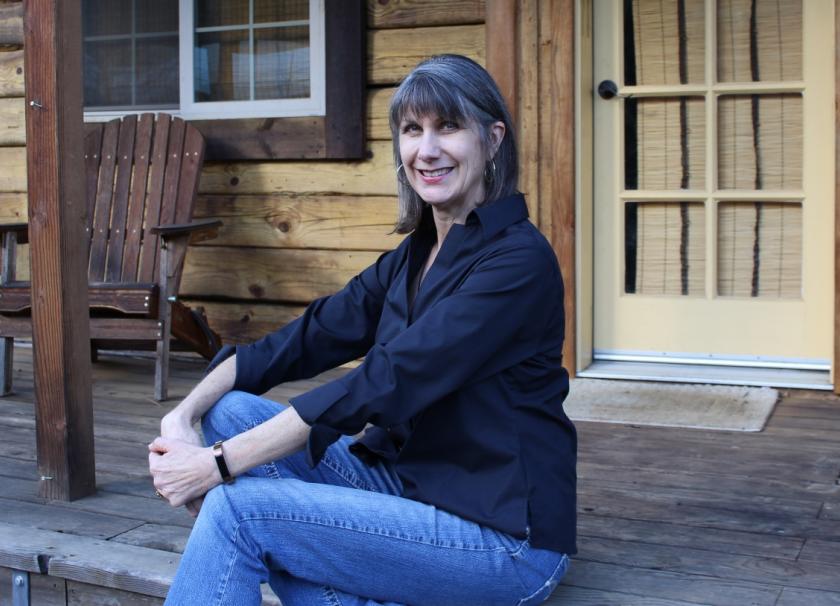
Meet Cooking Class Instructor, Gianaclis Caldwell
Get to know Gianaclis Caldwell ahead of her class, "Easy Mozzarella and Burratta - From Scratch!" on March 7. Gianaclis is the author of the award-winning book Mastering Artisan Cheesemaking and owner of Pholia Farm.
Tell us how your love of cooking (or cheese) and food began.

Wellness Secret Weapons
There are still plenty of colds and viruses making their rounds, and we want to help you better defend against them!
In January, we asked on social media what kind of secret weapons you use in the winter to stay healthy. We had a lot of responses, so we'll start with the All-Stars.
With your initial recommendations, our Wellness team reviewed the suggestions and picked the products with the highest quality standards and best feedback. Check those out below.

Mushrooms for wellness
You may have heard about the fascinating discovery that trees can communicate with each other. What’s the secret? The mycelia - tiny strands of fungus - in the soil form a vast underground network through which trees send chemical signals to their neighbors.
The mycelia differs from the fruiting body of the mushroom, which is the reproductive component that contains spores and is thought to be higher in Beta Glucans.
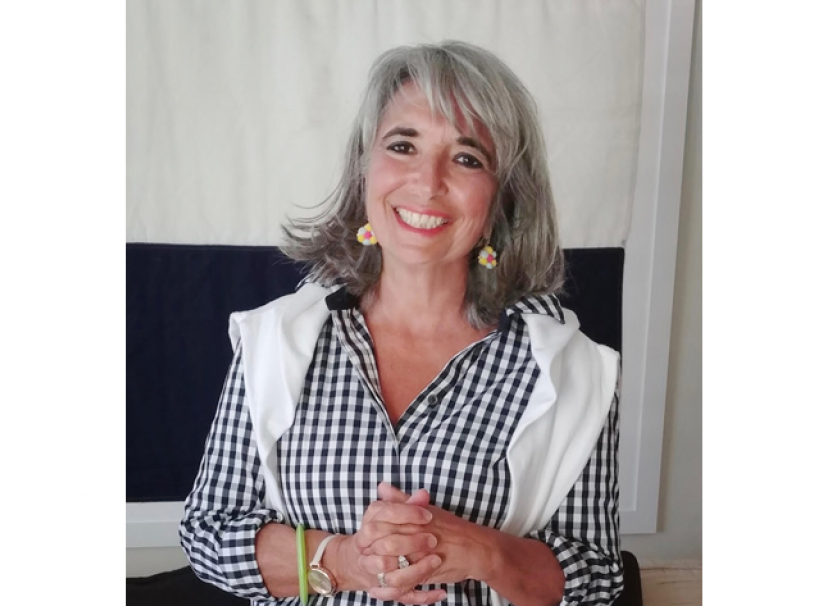
Meet class instructor, Joette Calabrese
This class instructor profile is connected to the February 27 free lecture, "You, Too, Can Beat the Flu!"
On an early Kolkata (Calcutta) morning, thick crowds gather outside the gates of the hospital while officials yell out "Brain tumor, kidney failure, cancer patients form a line here!” Hopeful patients, family members and caregivers arrange themselves by disease symptom.
What to do with all this citrus?!
So you grabbed a few too many extra oranges and grapefruits and lemons (and some finger limes, and some satsumas…), and rather than watch them go bad, we want to provide you with some ideas on how to reduce waste. You’ll also get to enjoy citrus in a lot of new ways!
There are many guides and recipes across the internet (like this one by our friends at Grow Forage Cook Ferment), so here are a few ideas to get your creative and citrus juices flowing.

Update from the General Manager: "Food for Paradise" campaign
Ashland Food Co-op's General Manager, Emile Amarotico, ends 2018 on a very uplifting note with a report back on the "Food for Paradise" donation campaign. Watch the video below, or read on for an extended written update.
Hello, this is Emile Amarotico, the general manager of Ashland Food Co-op with an update on the Co-op’s Food for Paradise initiative.
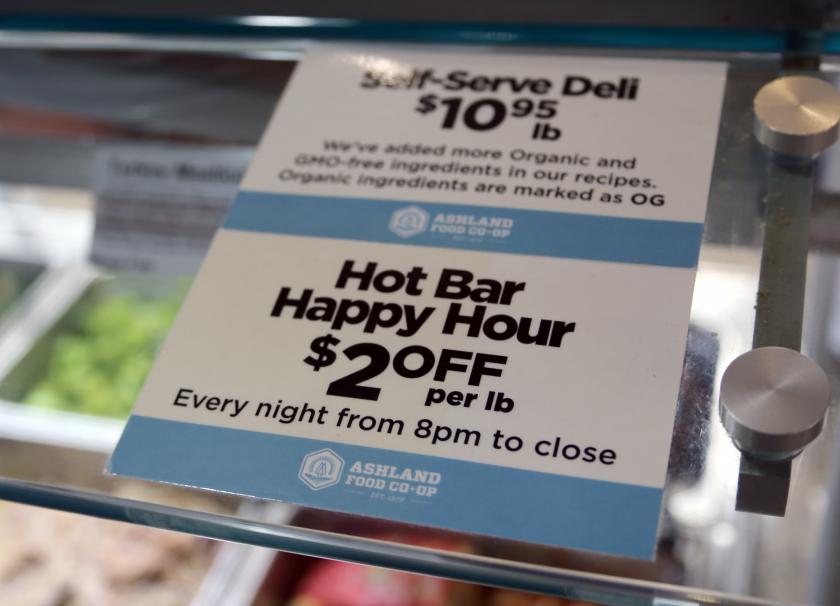
5 Fresh Ways to Save at the Co-op
We’ve all been there: your bank account is looking thin after a month of celebrations, but you’ve made a New Year’s resolution to save up for a big purchase later in the year
Now’s the time to make some changes to your spending - but that doesn’t mean you have to skimp on quality goods at the Ashland Food Co-op.
These are some lesser known ways to save at the Co-op. Think of them like ordering off the secret menu.
Savings Level: $

Board Report: How "Food For Paradise" Got Started
By Mira Wonderwheel, Board of Directors

4 Ways to Reduce Your Food Waste
It’s the New Year, our favorite time for goal-setting, making positive resolutions, and shifting our impact. One of the Co-op’s goals is to become a Zero Waste facility. Our staff works to divert as much food waste as we can - and we hope our member-owners will join us in this goal too.
